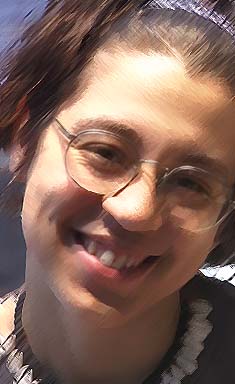 |

A writer's ebullience should not be necessary cause to dismiss their
literature. Still, it's rare to see a writer weigh in with both a
positive attitude and issue-driven work. Somehow, we're conditioned to
think that issues beget dogma, dogma begets preachiness, and preachiness
begets a dour attitude. Therefore issues are the death of literary pleasure.
Right?
Most happily, no. Tara Betts is the total exception to that notion. Betts knows flat issues do not make a poem. She lives in a more narrative space than most formalistic poets. Her stories are trim with personalities and their signifying actions -- looks in the eyes of people on the street, the chat of friends, catch-phrases among relatives, the casual observations of students. The people in her pieces, whether created or real, are animated principles. They anthropomorphize. They show instead of tell. But while stories they may be, her pieces' economy of word and phrase points to the spark of performance poetry. Her language lives when its spoken.
Betts also considers race's significance and its interpretation by people unsure of what they're seeing. She speaks quite plainly and directly about this in her work, and so gives voice to a growing number of Americans (and people elsewhere, also) who are not simply one race nor another. She makes it clear that her identity is African-American, but allows room for interpretation in her writing -- or extrapolation, as the case may be -- so others may identify through it, too.
Betts is well-known in Chicago among published and performing poets alike, and comes to this recognition at a young age. Still in her twenties, she has collected an impressive curriculum vitae of readings, publications, and academic credits. But she remains an accessible and visible person, choosing to engage literary audiences, writers, and workshop students where many people might otherwise retract. There is something about Betts which is not content to leave things exactly in the (conceptual) place where they're found or, perhaps, even intended to be. Something has to cross over from one place to another, and often that thing is the writer herself.
She has an active interest in the whole of a reading, not just her own part, and often collaborates with other poets in writing circles or group presentations. The "Women Out Loud" series at Chicago's Mad Bar is a good example. Where it would be easy to place a feminist reading/performance in a gallery, an arts center, or a loft in a bohemian ghetto, Betts works with others, including Mad Bar poetry producer Krystal Ashe, to bring poetry out to a pan-ethnic and highly social space. As a result, her work functions in a lot of ways at once, and gains from the exposure to multiple social, aesthetic, cultural, and political interactions.
All this, of course, furthers the access to the deeper politic Betts carries and reflects in her outgoing nature: a humanity for others and the gentle but firm persuasion that people have worth. Often the subjects of her writing are themselves unaware of that worth. But her identification with them, and therefore with all of us, verges on family. We know her personae closely, not as enemies but as if we lived with them. And in fact we do know them, as neighbors, as customers, as passers-by who glance our way. So if we accept the worth of ourselves, our society, as family to a point beyond cliché and into earnest consideration, we begin seeing the reasons for Betts' optimism. We commune. We heal.
What remains for us readers, then, are these simple questions: Are we worth what Tara Betts suggests? And if we are really family, can we finally respect each other (and ourselves) befittingly? Let's live in a more positive place and hope so. We have her poetry to show us the way.
- Kurt Heintz, e-poets network
 |